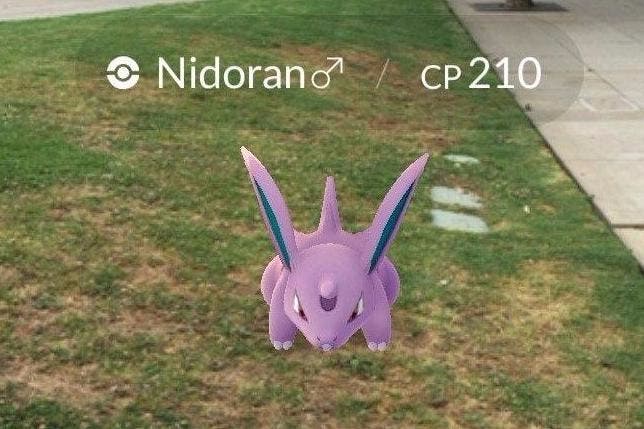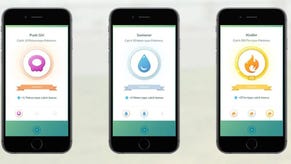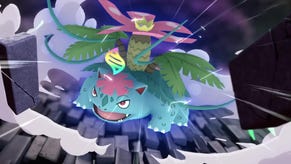Pokémon Go - How to find Pokémon in spawn locations, biomes and using radars
How and where to discover Pokémon out in the real world.
There are many ways to find Pokémon in Pokémon Go, with some more efficient than others.
To understand the best ways, it's worth remembering the conceit of the game: creatures are found in real-world locations, with the app using Google Maps and Ingress data to place PokeStops, Gyms and other attractions into the game.
It uses different types of areas within the map data to sort where the many different types of Pokémon should be found. Need some water Pokemon? Then head to a canal, river or lake to increase your chances of finding them.
If you don't live near in the right habitat - for example, you're far away from any kind of water - then don't fret. You can get pretty much any type of creature anywhere in the world - they are just more common in some locations than others.
Learning how to use the in-game radar, as well as understanding a little how spawn locations and biomes work - will really help if you want to catch 'em all.
There are other means too - such as finding rare Pokémon from hatching eggs and, at some point in the future, from trading with other Pokemon Go players - but by and large, heading into the wild is the way to go.
- Note: This page is a due a revision with the arrival of the December 2017 Gen 3 and weather effects update. We'll be updating this page with new information at a later date.
On this page:
Where to find Pokémon from spawn locations and biomes
As mentioned, Pokémon are more like to spawn in certain locations than others - water Pokémon spawning near coasts, rivers and canals is an easy-to-understand example of this.
It's important to note that there's no guarantee you'll find those types at such locations, nor are these types exclusive to these places - it just might increase their chances of being there. The opposite is true - water Pokémon can appear in the middle of a park, miles away from water.
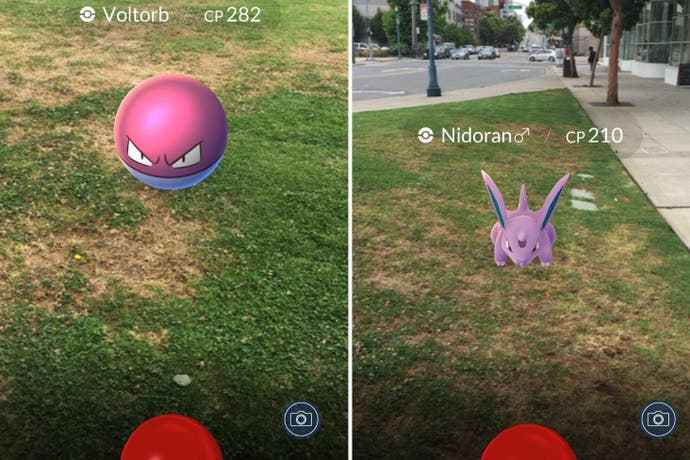
You may also notice specific types of Pokémon appearing in one location over and over, and the community has come to describe these spawn points as 'biomes'. In theory, the same groups of Pokémon (usually ranging in the same one or two types, such as rock or ground, with common to very rare spawns within them) will spawn in the same radius - the radius being a small point, or a large area.
Biomes aren't easy to spot and categorise, and the best way to learn the types of biomes near you is to simply observe them over time using the Nearby radar. It's not an exact science, but this post on the Silph Road Reddit by Shiranui85 goes into greater detail, and even attempts to provide specific examples of different creatures that could spawn together.
This is also not to be confused with the concept of Pokémon nests, which are regularly rotating hordes of creatures within a particular patch, like a park.
That said, the below list of real-world locations can help narrow down the types that should appear there. Again, it's not exact or guaranteed, but should give you an idea of what to expect if you're exploring.
Thanks to our friends at Eurogamer Germany for the below list.
Where to increase chances of finding Normal Type Pokémon: Pretty much everywhere - fields, roads of all kinds, schools, universities, businesses, libraries, stadiums and more.
All Normal Type in Gen 1: Pidgey, Pidgeotto, Pidgeot, Rattata, Raticate, Spearow, Fearow, Clefairy, Clefable, Jigglypuff, Wifflytuff, Meowth, Persian, Farfetch'd (region exclusive), Doduo, Dodrio, Chansey, Kangaskhan (region exclusive), Tauros (region exclusive), Ditto, Eevee, Porygon, Snorlax
All Normal Types in Gen 2: Sentret, Furret, Hoothoot, Noctowl, Aipom, Girafarig, Dunsparce, Teddiursa, Ursaring, Stantler, Miltank, Blissey

Where to increase chances of finding Rock Type Pokémon quarries, towns, parking and highways, large commercial installations
All Rock Types in Gen 1: Geodude, Graveler, Golem, Onix, Rhyhorn, Rhydon, Omanyte, Omastar, Kabuto, Kabutops, Aerodactyl
All Rock Types in Gen 2: Sudowoodo, Shuckle, Magcargo, Corsola (region exclusive), Larvitar, Pupitar, Tyranitar

Where to increase chances of finding Steel Type Pokémon: Modern buildings, railway stations (never go onto lines, obviously - play safely from a building!)
All Steel Types in Gen 1: Magnemite, Magneton
All Steel Types in Gen 2: Forretress, Skarmory
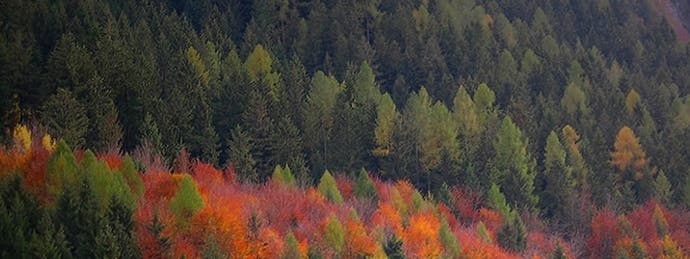
Where to increase chances of finding Grass Type Pokémon: Farmland, farms, forests, gardens, any kind of grass or green space, playgrounds, green residential areas
All Grass Types in Gen 1: Bulbasaur, Ivysaur, Venusaur, Oddish, Gloom, Vileplume, Paras, Parasect, Bellsprout, Weepinbell, Victreebel, Exeggcute, Exeggutor, Tangela
All Grass Types in Gen 2: Chikorita, Bayleef, Maganium, Hoppip, Skiploom, Jumpluff, Sunkern
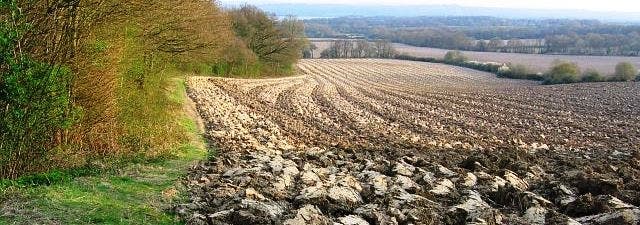
Where to increase chances of finding Ground Type Pokémon: Airports (never go onto them, obviously - play safely from a building!) open land and arable land, ditches, streams, not concreted parking
All Ground Types in Gen 1: Sandshrew, Sandslash, Nidoqueen, Nidoking, Diglett, Dugtrio, Geodude, Graveler, Golem, Onix, Cubone, Marawak, Rhyhorn, Rhydon
All Ground Types in Gen 2: Wooper, Quagsire, Gligar, Swinub, Piloswine, Phanpy, Dolphan, Larvitar, Pupitar

Where to increase chances of finding Dragon Type Pokémon: Famous places and landmarks in cities and in the country (for example, locks)
All Dragon Types in Gen 1: Dratini, Dragonair, Dragonite

Where to increase chances of finding Fairy Pokémon: cemeteries, churches, landmarks and monuments
All Fairy Types in Gen 1: Clefairy, Clefable
All Fairy Types in Gen 2: Togetic, Snubbull, Granbull

Where to increase chances of finding Water Type Pokémon: Wherever water is - so rivers, lakes, oceans, harbors, canals and more.
All Water Types in Gen 1: Squirtle, Wartortle, Blastoise, Psyduck, Golduck, Poliwag, Poliwhirl, Poliwrath, Slowpoke, Slowbro, Seel, Dewgong, Shellder, Cloyster, Krabby, Kingler, Horsea, Seadra, Goldeen, Seaking, Staryu, Starmie, Magikarp, Gyarados, Lapras, Vaporeon, Omanyte, Omastar, Kabuto, Kabutops
All Water Types in Gen 2: Totodile, Croconaw, Feraligatr, Chinchou, Lanturn, Marill, Azumarill, Wooper, Quagsire, Quilfish, Corsola (region exclusive), Remoraid, Octillery, Mantine

Where to find Ghost Type Pokémon: Cemeteries, cities, residential
All Ghost Types in Gen 1: Gastly, Haunter, Gengar
All Ghost Types in Gen 2: Misdreavus

Where to increase chances of finding Bugs and Flying Pokémon: In the countryside, farms, fields, forests, large parks and playgrounds
All Flying Types in Gen 1: Charizard, Butterfree, Pidgey, Pidgeotto, Pidgeot, Spearow, Fearow, Zubat, Golbat, Farfetch'd, Doduo, Dodrio, Scyther, Gyarados, Aerodactyl, Articuno, Zapdos, Moltres, Dragonite
All Flying Types in Gen 2: Hoothoot, Noctowl, Ledyba, Ledian, Crobat, Togetic, Natu, Xatu, Hoppip, Skiploom, Jumpluff, Yanma, Murkrow, Gligar, Mantine, Skarmory
All Bug Types in Gen 1: Caterpie, Metapod, Butterfree, Weedle, Kakuna, Beedrill, Paras, Parasect, Venonat, Venomoth, Scyther, Pinsir
All Bug Types in Gen 2: Ledyba, Ledian, Spinarak, Ariados, Yanma, Pineco, Forretress, Shuckle, Heracross (region exclusive)

Where to increase chances of finding Ice Type Pokémon: Grass (even if it is not frozen), glaciers or ski slopes
All Ice Types in Gen 1: Dewgong, Cloyster, Jynx, Lapras
All Ice Types in Gen 2: Sneasel, Swinub, Piloswine

Where to increase chances of finding Psychic Type Pokémon: everywhere, also rumoured to be near hospitals
All Psychic Types in Gen 1: Abra, Kadabra, Alakazam, Slowpoke, Slowbro, Drowzee, Hypno, Exeggcute, Exeggutor, Starmie, Mr Mime (region exclusive), Jynx
All Psychic Types in Gen 2: Natu, Xatu, Espeon, Unown, Wobbuffet, Girafarig

Where to increase chances of finding Electric Pokémon: Cities, industrial parks, power plants, power plants
All Electric Types in Gen 1: Pikachu, Raichu, Magnemite, Magneton, Voltorb, Electrode, Electabuzz, Jolteon
All Electric Types in Gen 2: Chinchou, Lanturn, Mareep, Flaaffy, Ampharos

Where to increase chances of finding Fire Type Pokémon: Everywhere, rumoured to be closer at residential and gas stations
All Fire Types in Gen 1: Charmander, Charmeleon, Charizard, Vulpix, Ninetales, Growlithe, Arcanine, Ponyta, Rapidash, Magmar, Flareon
All Fire Types in Gen 2: Cyndaquil, Quilava, Tyhlosion, Slugma, Magcargo, Houndour, Houndoom

Where to increase chances of finding Fighting Type Pokémon: Everywhere, rumoured to be closer to stadiums, arenas and large gyms
All Fighting Types in Gen 1: Mankey, Primeape, Poliwrath, Machop, Machoke, Machamp, Hitmonlee, Hitmonchan
All Fighting Types in Gen 2: Heracross (region exclusive), Hitmontop

Where to increase chances of finding Poison Pokémon: Everywhere, rumoured to be closer to moors, bogs
All Poison Types in Gen 1: Bulbasaur, Ivysaur, Venusaur, Weedle, Kakuna, Beedrill, Ekans, Arbok, Nidoran¡â, Nidorina, Nidoqueen, Nidoran¡á, Nidorino, Nidoking, Zubat, Golbat, Oddish, Gloom, Vileplume, Venonat, Venomoth, Bellsprout, Weepinbell, Victreebel, Tentacool, Tentacruel, Grimer, Muk, Gastly, Haunter, Gengar, Koffing, Weezing
All Poison Types in Gen 2: Spinarak, Ariados, Crobat, Quilfish
The Dual Destiny Season is here! Fashion Week has returned, bringing new costume Pokémon with it. You can now catch Dynamax Pokémon through Max Battles. First, however, you need to visit Power Spots to collect Max Particles and complete the To the Max! quest. Don't forget to try out Routes, Gift Exchange and Party Play while you're hunting down rare Pokémon, fighting in the Go Battle League or competing in PokéStop Showcases.
How to find Pokémon and use radars in Pokémon Go
After removing the buggy three-step method shortly after the game's launch, Pokémon Go was swiftly updated with Sightings and Nearby trackers. It's available by tapping the list of creatures in the bottom right corner of the main map screen.
Sighting radar tracker
This is similar to the original three-step radar, allowing you to see Pokémon in the local vicinity without knowing the distance or approximate location. It usually appears when no PokéStops are close by, and while you can't narrow down a location using this, it gives you a broad indication of what is nearby somewhere, if you want to take a little stroll in the hope you might stumble into something.
Nearby radar tracker
This in-game radar shows you where specific Pokémon are located relative to PokéStops. Select the Pokémon you want, and you will get a close up view of the Pokéstop. Tap again, and the map will zoom out and show you the route to that stop.
Pokémon will spawn fairly close by to the stop, and usually not right on top of it, so if it doesn't appear straight away, try and walk around a little until it appears.
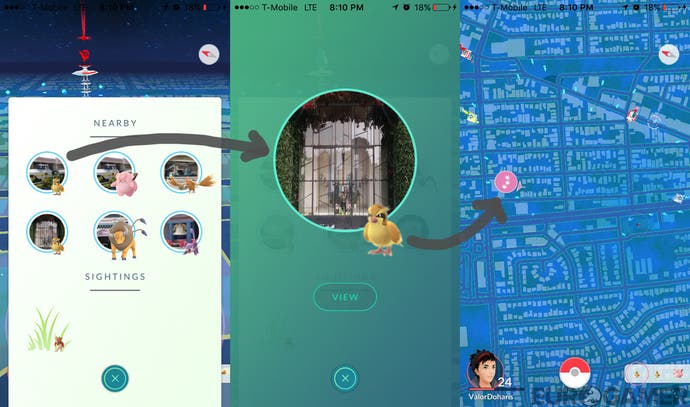
Also note that creatures tend to spawn for about 20 minutes before disappearing - so if you spot something you want, be sure to head over and get it sooner than later.
Note if something you're tracking disappears (the game will say it has ran away) it doesn't mean it's gone just yet - we've had some success turning up at a Stop a minute or two after the message, and our desired creature was still lurking.
The Nearby tracker is no match for online trackers such as the now shuttered PokéRadar - though some unofficial counterparts are still active for many of the world's cities - but it is a very useful tool, whether you're on the go or situated in one place.
We've taken a liking to having it open during work hours, taking an occasional glance when we can, and have managed to pick up rare creatures such as a Snorlax, Lapras, Pupitar and a Hitmontop as a result. (Over the course of several weeks of checking, of course.) It's also helped us identify possible biomes nearby, such as a regular Rhyhorn spawn that is coming useful for accumulating Candy for competitive play.
Also remember that not every Pokémon can be found in the wild, such as region-exclusives including Tauros, Kangaskhan, Mr. Mime and Farfetch'd, baby Pokémon, as well as more elusive Pokémon such as Mewtwo, Mew and the Legendary Birds - at least not yet, anyway!
